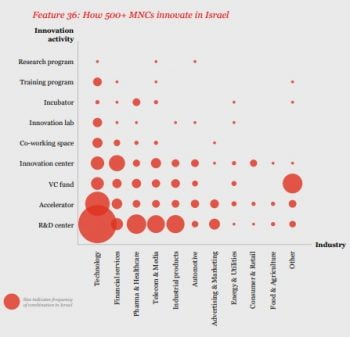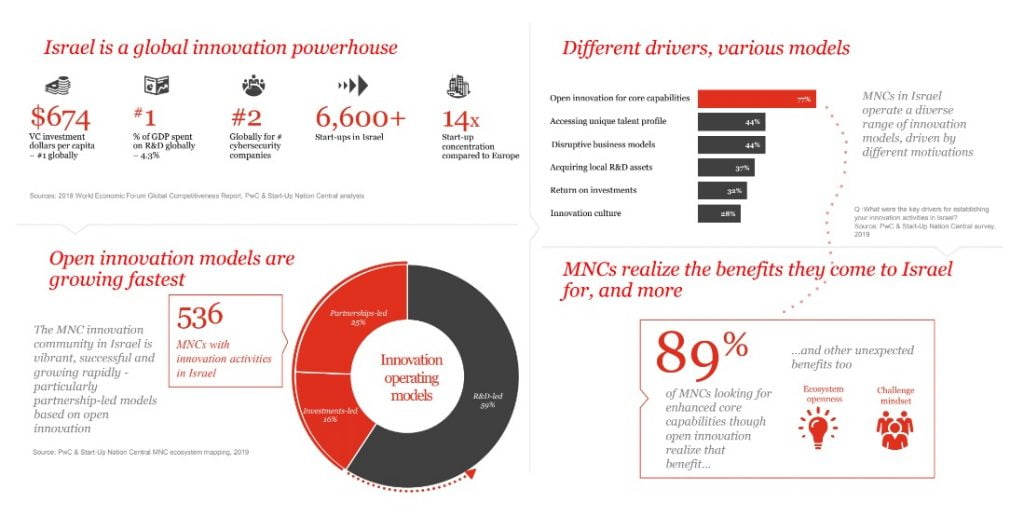Over 500 multinational corporations (MNCs) from some 35 countries are active in Israel, a majority of them seeking to enhance their core capabilities through open innovation in the “Startup Nation,” according to a new survey published on Tuesday.
The report titled “The State of Innovation,” and released by Start-Up Nation Central (SNC) and PwC Israel (PricewaterhouseCoopers Advisory Ltd), offers a comprehensive look at the status and evolution of multinational activity in Israel as a leading innovation destination and the home of the highest concentration of startups per capita in the world.
These multinationals are looking to Israel’s “6,000 plus startups for new ideas, quick prototyping ability, and infectious entrepreneurial culture,” according to a press release announcing the survey whose authors collected data points from more than 90 multinationals and interviewed 73 executives and innovation leaders from 22 countries.
Of the 536 multinationals in Israel, according to the report, 55 percent are headquartered in the US, with 27 percent in Europe and 15 percent from Asia-Pacific. Technology companies account for 38 percent of the MNCs in Israel, pharmaceuticals and healthcare companies make up 11 percent, financial services 10 percent, industry products 10 percent and telecommunications and media firms eight percent.
SEE ALSO: More Multinationals Are Tapping Into Israel’s Fintech Ecosystem
Open innovation, according to the report, includes “any activity involving collaboration with idea-rich, technology enabling third parties – often, but not necessarily, start-ups,” alongside innovation centers, accelerators, incubators, research programs, co-working spaces and corporate ventures funds. And some 77 percent of the multinationals surveyed in the report said they set up shop in Israel to tap into this openness as well as benefit from other factors such as Israel’s mindset of challenging known processes, decisions, and notions, and its positive approach to risk-taking and failure.
Multinational companies from across industries have been operating in Israel for decades, flocking to the country to invest in or acquire Israeli startups and recruit locally. Most have an R&D-led focus on engineering talent or IP assets, but a strong shift has been noted starting in 2014 “to more investment-led and partnership-led open innovation operating models,” the report reads. “This shift has been accelerating, as more MNCs with operations in Israel choose to engage in diverse ways with more stakeholders, making innovation costs variable and on-demand.”
The report also shows that foreign companies tend to “increase and diversify their innovation activity with time in market, for example, going from tech-led R&D centers to operating startup accelerators and engaging in joint ventures” with local VCs and other groups.
Global companies operating R&D centers in Israel still employ over 70,000 people (including in manufacturing facilities) as of January 2017, according to the survey, but there is “growing traction globally around open innovation, supply constraints around local engineering talent, and the growing popularity of Corporate Venture Capital.”
An R&D player entering the Israeli market through an “acquihire” (acquisition of a local company to tap into its talent) “will realize over time the need to open innovation activities to local innovators, primarily start-ups.” These innovation activities allow MNCs “to tap into the wide range of Israeli innovation, developing solutions with early and more mature start-ups, hiring and retaining local talent, or supporting and partnering with leading research institutions.”
Sign up for our free weekly newsletter
Subscribe
A graph showing how multinationals’ innovation activity in Israel, as part of the ‘State of Innovation’ report by SNC and PwC, April 2019.
Of the multinationals surveyed, 40 percent cited Israel as a distinctive location for their global activities, distinct from any other innovation locations. “Israel often offers faster results and requires smaller teams owing to the more concentrated, networked market and the distinctive execution pace of local teams,” the report reads.
Kai Beckmann, CEO of Performance Materials at German pharmaceutical and chemicals firm Merck told the report’s authors that “roughly almost half of [our] healthcare revenue is based on innovation stemming from Israel […] This tells us a lot of the story of how important Israel is to Merck.”
Multinationals in Israel are also increasingly displaying “some of the characteristics of the startups they’re working with, including regular pivots to new technology focus areas, faster execution of projects, and a higher tolerance for failure.”
“The Israeli way of approaching risk and failure, and the importance of giving startups independence and space to innovate – these core characteristics of the Israeli ecosystem allow MNCs to step outside of their comfort zone, re-think their approach to innovation and effectively tap into Israeli innovation,” the report states.
Pivots take many forms, the survey notes, including changing the portfolio of innovation activities maintained, shifting the focus of the technology categories, and interacting with stakeholders at different maturity levels.
SEE ALSO: 87 Global Corporations Flocked To Israel For Tech And Talent In Past Three Years
Deutsche Telekom, for example, hosts management teams in Israel to “absorb” startup thinking, according to the authors, while Pfizer, Genpact, Flex and Johnson Controls all have senior executives located in Israel who manage their companies’ global scope of technology scouting, product development, or open collaboration activities. Siemens’ Dynamo and the Innogy Innovation Hub are unique innovation vehicles, not replicated anywhere in those groups’ global innovation portfolios, the report’s accompanying release notes.
It further adds that the multinational innovation activity in Israel has “spurred growth in the number of third-party innovation facilitators, often within an industry, noting The Shelf accelerator in the retail sector and The Dock in the shipping and logistics sector as examples.
“Coca Cola, Turner, Walmart, and Mercedes Benz work with The Bridge Builders to source and develop commercialized partnerships. These groups and others like them leverage industry contacts to host MNC delegations, scout for bespoke profiles, and coach startups in navigating MNC collaborations,” the release reads.
Related posts

Editors’ & Readers’ Choice: 10 Favorite NoCamels Articles

Forward Facing: What Does The Future Hold For Israeli High-Tech?

Impact Innovation: Israeli Startups That Could Shape Our Future





Facebook comments